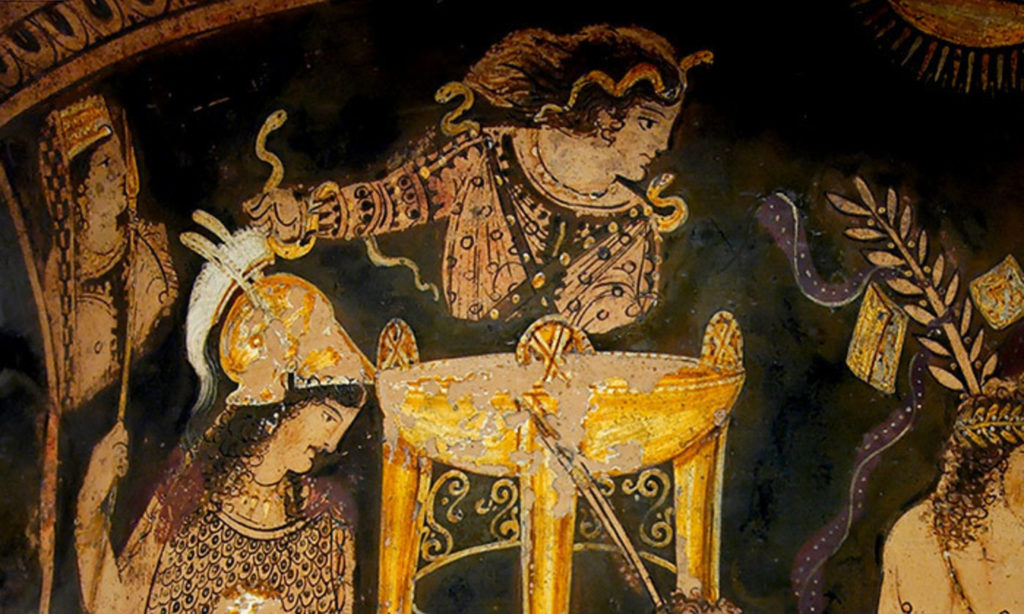
Thursday
Robert Mueller resembles an oracle more and more with each passing day. By this I mean he makes elliptical pronouncements that frustrate people desiring a clearer statement. Trump critics hoped Mueller would forthrightly state that (a) yes, the president and his campaign encouraged and applauded Russia’s 2016 election attack and (b) that Trump has been attempting to obstruct inquiry into this encouragement ever since. Trump’s supporters, of course, wanted him to declare “no collusion, no obstruction, total exoneration.” Mueller gave us neither.
Like an oracle, however, he provided us what we need if we listen carefully. To show how oracles work, I first turn to one of literature’s most famous accounts of an oracle in action.
In Sophocles’s Oedipus, the king sends his brother-in-law Creon to Delphi to inquire why a plague is ravaging Thebes. Significantly, the oracle does not directly name Oedipus. Instead it says that the city must deal with the murder of the former king, whose unaddressed murder is polluting the city. Here’s the important interchange:
Creon: King Phoebus [Apollo] in plain words commanded us
to drive out a pollution from our land,
pollution grown ingrained within the land;
drive it out, said the God, not cherish it,
till it’s past cure.
Oedipus: What is the rite
of purification? How shall it be done?
Creon: By banishing a man, or expiation
of blood by blood, since it is murder guilt
which holds our city in this destroying storm.
The oracle also tells Creon that Laius’s murderer is close at hand:
Creon: The clue is in this land;
that which is sought is found;
the unheeded thing escapes:
So said the God.
In other words, it will be up to the Thebans to save themselves. The oracle just points them in the right direction.
Which is what Mueller has done. Unlike the oracle, however, he explained (albeit somewhat cryptically) why he didn’t finger the president. Because Department of Justice guidelines prohibit indicting a sitting president (even with a sealed indictment), it’s up to a different governmental body to hold the president accountable. As Mueller put it, “the Constitution requires a process other than the criminal-justice system to formally accuse a sitting President of wrongdoing.”
In other words, while Mueller can’t find Trump guilty, the facts don’t allow him or Attorney General William Barr to declare him innocent. Here’s how Jon Stoehr of The Editorial Board sums it up:
Whatever insights we glean [from the Mueller Report] are a matter of subjective interpretation. But it’s pretty clear what Mueller was saying. I’ve honored my end of the bargain, he said in essence. Now it’s up to the US Congress and the American people to decide whether Donald Trump is 1) a legitimate president and 2) a criminal. He’s not going tell us which. We have to do that work for ourselves.
And further:
Basically Mueller was saying this: I’m not going to accuse Donald Trump of committing crimes, because it’s not my place to accuse this or any president of committing crimes. But I’m also not going to say he didn’t commit a crime, because I’m a man of integrity. So I’m going to walk a fine line, hoping other Americans of integrity fill in the gaps. The result of such hairsplitting is stuff like this: “If we had confidence that the president did not commit a crime, we would have said so.”
Translation: Trump committed crimes, but only the US Congress has the authority to say so, then do something about it. Or not. Inaction, too, is up to the Congress.
Like Oedipus, Congressional Democrats were hoping for something that made their lives easier, a slam dunk statement that spelled out how they should act. But the Mueller Report has made it clear enough, and it’s now up to them to respond.
Oedipus has the courage to see his inquiry through to the end, even as others, sensing the truth, beg him to back off. Jocasta, sounding like a swing-district Democrat lobbying Nancy Pelosi, says,
I beg you—do not hunt this out—I beg you,
if you have any care for your own life.
What I am suffering is enough.
Oedipus pushes his way through, however, tracking down every clue, discovering the source of the plague, and taking dramatic action. Political expediency is less important to him than the truth.
For this he suffers in the short run but gains eternal glory in the end, as revealed in Oedipus at Colonus. Whatever risks the Democrats face in pursuing a principled impeachment inquiry could be rewarded by history. Possibly they won’t even have to wait that long since the electorate may well applaud their boldness.
I conclude with Lucille Clifton’s Martin Luther King poem “the meeting after the savior gone.” Relying on someone to save us, whether a King or a Mueller, is never the answer, she warns:
what we decided is
you save your own self.
everybody so quiet
not so much sorry as
resigned
we was going to try and save you but
now i guess you got to save yourselves
(even if you don’t know
who you are
where you been
where you headed)
Resignation and confusion is not an option. Time to get to work.